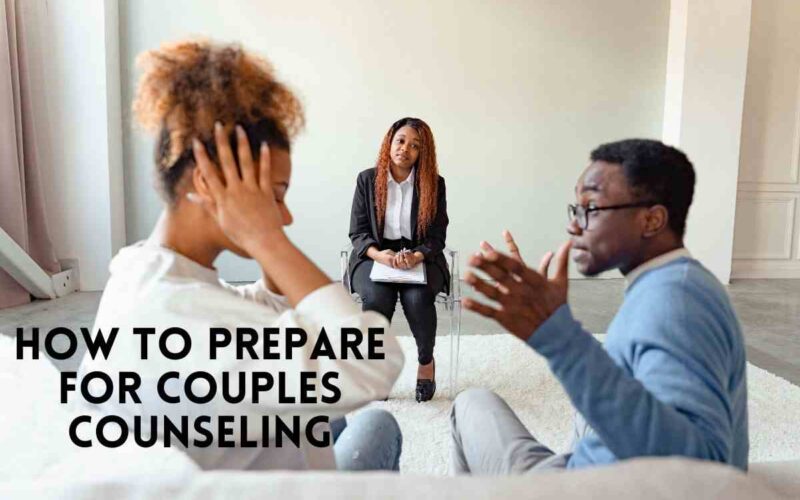Couples counseling is a professional therapeutic service designed to help couples navigate relationship challenges, enhance communication, and strengthen their bond. It provides a safe and supportive environment where couples can explore their feelings, improve their understanding of each other, and develop healthier ways of relating. Through couples counseling, individuals gain insights into their patterns of interaction, learn effective communication techniques, and acquire tools to resolve conflicts constructively.
How To Prepare For Couples Counseling
Before embarking on couples counseling, it is crucial to understand its purpose. Couples counseling aims to provide a structured space for couples to address relationship difficulties, rebuild trust, enhance intimacy, and work towards a more fulfilling partnership. It can be helpful in dealing with various concerns, such as communication problems, conflict resolution, infidelity, financial issues, and parenting disagreements. By addressing these challenges with the guidance of a professional, couples can gain new perspectives and develop healthier relationship dynamics.
Finding the Right Couples Counselor
Choosing the right couples counselor is a critical step in preparing for couples counseling. It is essential to select a qualified and experienced professional who specializes in couples therapy. Look for counselors with appropriate credentials, such as licensed marriage and family therapists or psychologists with expertise in relationships. Research potential counselors, read reviews, and consider seeking recommendations from trusted sources. Additionally, ensure that the counselor’s approach aligns with your values and goals for counseling.
Establishing Open Communication
Open and honest communication is the foundation of a healthy relationship, and it is equally important in couples counseling. To prepare for counseling, couples should focus on improving their communication skills. This involves active listening, expressing thoughts and emotions effectively, and practicing empathy and understanding. By establishing a safe space for open communication, couples can foster a supportive environment within the counseling sessions and enhance their ability to address challenging topics.
Setting Goals for Couples Counseling
Setting goals for couples counseling provides direction and focus throughout the therapeutic process. It is essential to reflect on the specific areas of the relationship that need improvement and identify the desired outcomes. Goals can range from enhancing communication and resolving conflicts to rebuilding trust or reigniting intimacy. Collaboratively establish realistic and measurable goals with your partner, ensuring they align with both individuals’ needs and aspirations.
Reflecting on Individual Expectations and Concerns
Before attending couples counseling, it is beneficial for individuals to reflect on their expectations and concerns regarding the process. Consider what you hope to achieve personally and within the relationship through counseling. Identify any anxieties or reservations you may have and discuss them openly with your partner. This self-reflection enables individuals to be more actively engaged in the counseling process and facilitates personal growth alongside relationship development.
Discussing Financial and Logistical Considerations
Discussing financial and logistical considerations is an essential part of couples counseling preparation. Understand the financial aspects of counseling, such as session fees, insurance coverage, and potential reimbursement options. If financial concerns arise, explore sliding-scale fees or inquire about community resources that offer affordable counseling services. Additionally, plan the logistics of attending counseling sessions, considering factors such as scheduling, transportation, and childcare if needed.
Managing Expectations for Couples Counseling
While couples counseling can be transformative, it is essential to have realistic expectations. Recognize that counseling is a process that takes time, effort, and commitment. It is not a quick fix for relationship issues but a journey towards understanding, growth, and positive change. Understand that progress may be gradual, and setbacks can occur along the way. By managing expectations, couples can approach counseling with patience, resilience, and a willingness to embrace the transformative potential of the experience.
Openness to Change and Growth
Couples counseling provides an opportunity for both partners to grow individually and as a couple. To make the most of counseling, it is crucial to embrace change and be open to new perspectives. This may involve challenging long-held beliefs or behaviors that contribute to relationship difficulties. By adopting a growth mindset and demonstrating willingness to change, individuals can create a fertile ground for personal and relational development.
Commitment to the Process
Commitment to the counseling process is paramount for achieving positive outcomes. Active participation, engagement, and dedication to the therapeutic journey are key. Attend sessions regularly, complete recommended homework assignments, and implement the strategies discussed during counseling sessions. Remember that the effort invested in counseling can lead to a more satisfying and fulfilling relationship.
Self-Care During Couples Counseling
Engaging in self-care practices is crucial during couples counseling to support emotional well-being and maintain a healthy balance. Prioritize activities that promote relaxation, reduce stress, and foster self-reflection. This may include exercise, meditation, journaling, spending time with loved ones, or pursuing personal hobbies. By nurturing your well-being, you can bring a more centered and grounded self to the counseling process.
Strategies for Making the Most of Counseling Sessions
To maximize the effectiveness of counseling sessions, it is helpful to employ strategies that facilitate meaningful dialogue and progress. Actively listen to your partner without interruption, practice empathy, and seek to understand their perspective. Be open and honest with the counselor, sharing your thoughts, emotions, and concerns openly. Engage in active problem-solving, exploring solutions together, and implementing the strategies discussed during sessions.
Dealing with Challenges Along the Way
Challenges may arise during the couples counseling journey, and it is essential to address them proactively. Recognize that setbacks or difficult emotions are a normal part of the process. Maintain open communication with your partner and the counselor, expressing concerns or frustrations as they arise. By viewing challenges as opportunities for growth and learning, couples can navigate them effectively and maintain momentum towards positive change.
Building on Progress Made in Couples Counseling
As couples make progress in counseling, it is important to build upon the gains achieved. Integrate the skills, insights, and strategies learned during counseling into everyday life. Continuously communicate and reinforce positive changes in the relationship. Regularly reflect on progress made and identify areas where further growth is desired. By building on the foundation established in counseling, couples can create a lasting and fulfilling partnership.
Conclusion
Preparing for couples counseling is an essential step towards fostering a healthier and more satisfying relationship. By understanding the purpose of counseling, finding the right counselor, establishing open communication, setting goals, and reflecting on individual expectations, couples can optimize their counseling experience.
Additionally, managing expectations, embracing change and growth, and committing to the process are crucial for maximizing the benefits of couples counseling. Remember to engage in self-care, implement effective strategies during sessions, and address challenges proactively. By taking these proactive steps, couples can lay the groundwork for a more resilient and fulfilling partnership.
Frequently Asked Questions
1. How long does couples counseling typically last? Couples counseling duration can vary depending on the complexity of the issues and the progress made. On average, couples counseling may span several months, with weekly or bi-weekly sessions.
2. Can couples counseling be effective if only one partner is committed? While it is ideal for both partners to be committed to couples counseling, positive outcomes can still be achieved even if only one partner is initially invested. The dedicated partner can work on personal growth, gain insights, and develop healthier relationship dynamics, potentially influencing the overall relationship positively.
3. What if we feel uncomfortable discussing certain topics during couples counseling? Couples counseling provides a safe and non-judgmental space for discussing difficult topics. If discomfort arises, it is important to communicate this to the counselor, who can help create a supportive environment for addressing sensitive issues.
4. How can couples counseling benefit a healthy relationship? Couples counseling is not solely for troubled relationships. It can also benefit healthy relationships by providing tools to enhance communication, deepen emotional connection, and strengthen the bond between partners.
5. Can couples counseling prevent a relationship from ending in separation or divorce? Couples counseling can help address relationship issues and facilitate positive change, potentially reducing the likelihood of separation or divorce. However, the outcome ultimately depends on the unique circumstances and individuals involved.








